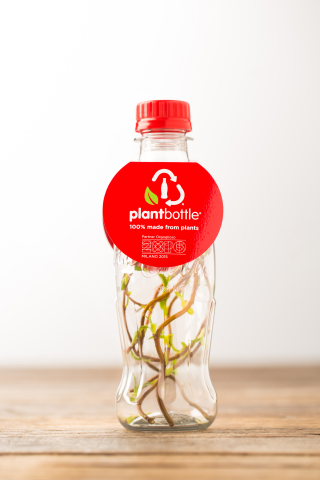 The Coca-Cola Company launched last week the world’s first PET plastic bottle made entirely from plant materials at the World Expo – Milan. I guess the question is if anybody is ready to invest in commercial production of bio-PX/PTA (the other component of PET bottle aside from bio-based monoethylene glycol) or even in FDCA, another bio-based alternative to PTA?
The Coca-Cola Company launched last week the world’s first PET plastic bottle made entirely from plant materials at the World Expo – Milan. I guess the question is if anybody is ready to invest in commercial production of bio-PX/PTA (the other component of PET bottle aside from bio-based monoethylene glycol) or even in FDCA, another bio-based alternative to PTA?
It is not news to the PET market that Coca-Cola has already produced demo pilot scale 100% bio-PET bottles. Last year in July, I reported on Tecnon OrbiChem’s Bio-Materials newsletter that Virent and bio-PET bottle manufacturer FENC (Far Eastern New Century) based in Taiwan, have successfully demonstrated production of a 100% bio-based PET bottle as part of Coca-Cola’s PlantBottle® program.
The bio-based paraxylene (PX) was supplied by Virent made using sugar as its starting material and produced via its patented BioForming process. FENC then converted the BioForm PX to bio-PTA, and subsequently to 100% bio-based PET resin. FENC started toll production of partially bio-based PET 3-4 years ago that contains bio-MEG and petro-based PTA.
PlantBottle® packaging is The Coca-Cola Company’s vision to develop a more responsible plant-based alternative to packaging traditionally made from fossil fuels and other non-renewable materials. PlantBottle packaging uses patented technology that converts natural sugars found in plants into the ingredients for making PET plastic bottles. The packaging looks, functions and recycles like traditional PET but has a lighter footprint on the planet and its scarce resources. Coca-Cola currently has collaborations with Virent, Gevo and Avantium for the bio-based PTA component (or PEF in the case with Avantium) for PlantBottle®.
Today, the company uses sugarcane and waste from the sugarcane manufacturing process to create the PlantBottle packaging. Both materials reportedly meet The Coca-Cola Company’s established sustainability criteria used to identify plant-based ingredients for PlantBottle material.
Since the 2009 launch, The Coca-Cola Company has distributed more than 35 billion bottles in nearly 40 countries using its current version of PlantBottle packaging which is made from up to 30% plant-based materials (Bio-MEG component). It is estimated the use of PlantBottle packaging since launch has helped save the equivalent annual emissions of more than 315,000 metric tons of carbon dioxide.
The Coca-Cola Company reportedly plans to continue investment in its award-winning PlantBottle packaging. Longer term, the challenge is to lower or even cut the premium costs for bio-based PET, and in order to do this, investments for higher production volume for bio-MEG (and soon for bio-PX/bio-PTA or PEF) will be required. But is there a strong enough demand pull for bio-PET from brand owners/consumers in order to justify these investments? That is the chicken-or-egg situation facing the renewable chemicals market especially for drop-in commodity chemicals.




